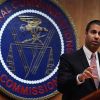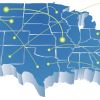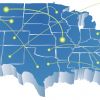-
 +15 +1
+15 +1Broadband Monopolies Are Acting Like Old Phone Monopolies. Good Thing Solutions to That Problem Already Exist
The future of competition in high-speed broadband access looks bleak. A vast majority of homes only have their cable monopoly as their choice for speeds in excess of 100 mbps and small ISPs and local governments are carrying the heavy load of deploying fiber networks that surpass gigabit cable networks. Research now shows that these new monopolies have striking similarities to the telephone monopolies of old.
-
 +25 +1
+25 +1Ajit Pai refuses to investigate Frontier’s horrible telecom service
Federal Communications Commission Chairman Ajit Pai has rejected a request to have the FCC investigate Frontier Communications' business practices in Minnesota, despite evidence that the company has failed to properly maintain its telecom network.
-
 +10 +1
+10 +1Refunds for 300 million phone users sought in lawsuits over location-data sales
The four major US wireless carriers are facing proposed class-action lawsuits accusing them of violating federal law by selling their customers' real-time location data to third parties. The complaints seeking class action status and financial damages were filed last week against AT&T, Verizon, T-Mobile, and Sprint in US District Court for the District of Maryland.
-
 +4 +1
+4 +1It turns out the FCC ‘drastically overstated’ US broadband deployment after all
Remember in February when the Federal Communications Commission essentially said that broadband deployment in the US is going great despite 20 million homes lacking access to high-speed connections? And then a month later, Microsoft basically called bullshit? Well, the FCC has finally admitted the report "drastically overstated" actual broadband deployment, but still insists everything is just fine.
-
 +7 +1
+7 +1Ajit Pai-proposed upgrade to 25Mbps starts paying off for rural ISPs
More than 106,000 rural homes and small businesses in 43 US states will get access to 25Mbps broadband at some point in the next decade thanks to a Federal Communications Commission policy change. The FCC's Connect America Fund (CAF), which distributes money to ISPs in exchange for new broadband deployments in underserved areas, had been requiring speeds of just 10Mbps downstream and 1Mbps upstream over the past few years. But FCC Chairman Ajit Pai led a vote in December 2018 to raise the standard for new CAF projects to 25Mbps down and 3Mbps up.
-
 +20 +1
+20 +1SpaceX cuts broadband-satellite altitude in half to prevent space debris
SpaceX has received Federal Communications Commission approval to halve the orbital altitude of more than 1,500 planned broadband satellites in order to lower the risk of space debris and improve latency. SpaceX's satellite project, named Starlink, aims to provide high-speed, low-latency broadband around the world. In a statement on the new FCC approval, SpaceX said that "Starlink production is well underway, and the first group of satellites have already arrived at the launch site for processing."
-
 +25 +1
+25 +1The Robocall Crisis Will Never Be Totally Fixed
Years into the robocalling frenzy, your phone probably still rings off the hook with "important information about your account," updates from the "Chinese embassy," and every bogus sweepstakes offer imaginable. That's despite promises from the telecom industry and the US government that solutions would be coming. Much like the firehose of spam that made email almost unusable in the late 1990s, robocalls have made people in the US wary of picking up their cell phones and landlines.
-
 +39 +1
+39 +1The FCC Has Fined Robocallers $208 Million. It’s Collected $6,790.
America’s telecommunications regulators have levied hefty financial penalties against illegal robocallers and demanded that bad actors repay millions to their victims. But years later, little money has been collected.
-
 +14 +1
+14 +1FTC launches probe into the privacy practices of several broadband providers
On Tuesday, the Federal Trade Commission announced it would be conducting an investigation into the privacy practices of several internet service providers. The inquiry comes only a month after the FTC formed its Technology Task Force to look into tech-related…
-
 +21 +1
+21 +1Fight against robocalls continues as AT&T, Comcast complete test of verified call
The fight against robocalls can even bring telecom rivals together.
-
 +8 +1
+8 +1AT&T CEO interrupted by a robocall during a live interview
Can we fix this now?
-
 +12 +1
+12 +1AT&T Jacks Up TV Prices Again After Merger, Despite Promising That Wouldn’t Happen
With the ink barely dry on AT&T’s $86 billion merger with Time Warner, the company keeps imposing price hikes on the company’s streaming and satellite TV subscribers. Price hikes AT&T executives repeatedly insisted wouldn’t happen. Cordcutter News was the first to report this week that AT&T will be scrapping its existing $40 per month DirecTV Now streaming video plan, replacing it with two new, more expensive options: a $50 per month and a $70 per month plan. The price increase comes on the heels of another $5 hike imposed on the streaming platform less than a year ago.
-
 +26 +1
+26 +1If We're Going to Break Up Big Tech, We Shouldn’t Forget Big Telecom
Senator Elizabeth Warren proposed breaking up tech giants Facebook, Google, and Amazon on Friday—but big telecom is in dire need of the same treatment. On Friday, Democratic Senator Elizabeth Warren proposed breaking up Google, Amazon, and Facebook in a bid to crack down on anti-competitive tech giants. The proposal, which suggests ramping up antitrust enforcement and unwinding the sector’s most problematic mergers, is poised to be a cornerstone of Warren’s 2020 presidential campaign.
-
 +10 +1
+10 +1Stalkers and Debt Collectors Impersonate Cops to Trick Big Telecom Into Giving Them Cell Phone Location Data
But some people don’t even pay for this data at all. Instead, bounty hunters and people with histories of domestic violence have managed to trick telecommunications companies into providing real-time location data by simply impersonating US officials over the phone and email, according to court records and multiple sources familiar with the technique.
-
 +4 +1
+4 +1FCC Says Gutting ISP Oversight Was Great For Broadband
The FCC this week proclaimed that broadband connectivity saw unprecedented growth last year thanks to agency policies like killing net neutrality. The problem? That doesn’t appear to be true. By law, the FCC is required to submit a periodic report on the state of U.S. broadband, noting whether or not affordable internet is being deployed on a “reasonable and timely basis.” While the FCC didn’t release its full data to the public, it did issue a press release citing some very specific statistics agency boss Ajit Pai claimed proved his agency was curing the “digital divide.”
-
 +6 +1
+6 +1New Bill Would Stop Internet Service Providers From Screwing You With Hidden Fees
Like the airline and hotel industries, the cable TV and broadband sector has a masterful knack for obnoxious, hidden fees. From fees for simply trying to pay your bill to broadband surcharges based entirely on fluff and nonsense, the industry has spent years advertising one rate, only to hit you with a significantly higher price once your bill actually comes due.
-
 +2 +1
+2 +1Texas bill would ban throttling in disaster areas
Earlier this week, a member of the Texas state legislature introduced a bill that would make it a crime for a telecommunications company, like Verizon or AT&T, to throttle internet service in declared disaster areas, according to KUT News. This Texas bill, HB 1426, doesn’t go any further to codify net neutrality rules, only prohibiting carriers from restricting internet access in disaster areas. It does not ban behaviors like throttling in any other scenarios.
-
 +14 +1
+14 +1House Democrats tell Ajit Pai: Stop screwing over the public
Democratic lawmakers have put Federal Communications Commission Chairman Ajit Pai on notice that he can expect a lot more scrutiny now that Democrats control the US House of Representatives. The House Commerce Committee is "reassuming its traditional role of oversight to ensure the agency is acting in the best interest of the public and consistent with its legislative authority," Commerce Committee Chairman Frank Pallone, Jr. (D-N.J.) and Communications and Technology Subcommittee Chairman Mike Doyle (D-Penn.) said in an announcement yesterday.
-
 +18 +1
+18 +1Ajit Pai loses in court—judges overturn gutting of tribal broadband program
A federal appeals court has overturned Ajit Pai's attempt to take broadband subsidies away from tribal residents. The Pai-led Federal Communications Commission voted 3-2 in November 2017 to make it much harder for tribal residents to obtain a $25-per-month Lifeline subsidy that reduces the cost of Internet or phone service. The change didn't take effect because in August 2018, the US Court of Appeals for the District of Columbia Circuit stayed the FCC decision pending appeal.
-
 +17 +1
+17 +1Net Neutrality’s Day in Court
The Court of Appeals for the D.C. Circuit heard the case of Mozilla v. FCC today to determine whether the Federal Communications Commission (FCC) is allowed to repeal its net neutrality rules and abandon its authority over the broadband industry. The case delved into many different legal and technical issues that reveal the extent the FCC is willing to stretch to abandon the Open Internet. On one side sat public interest advocates, local governments, and Internet companies large and small.
Submit a link
Start a discussion




















